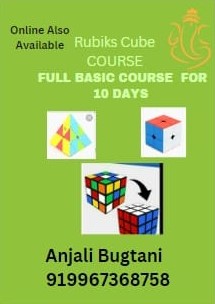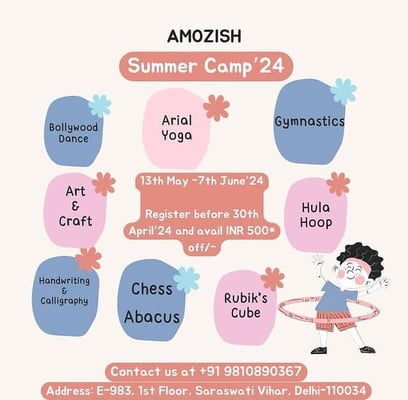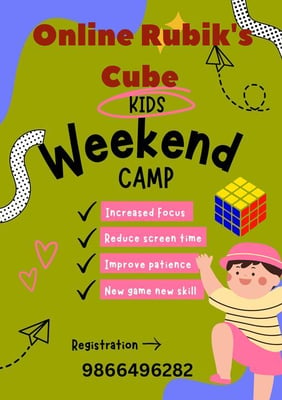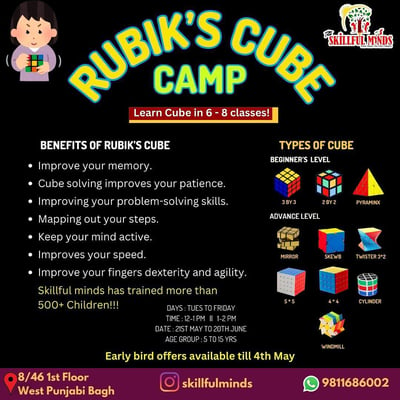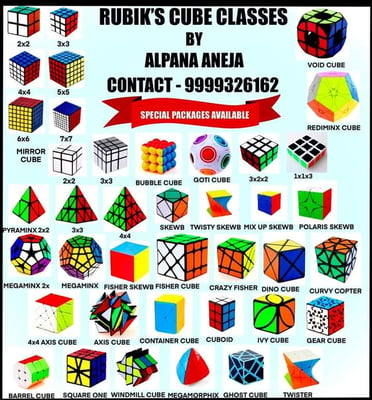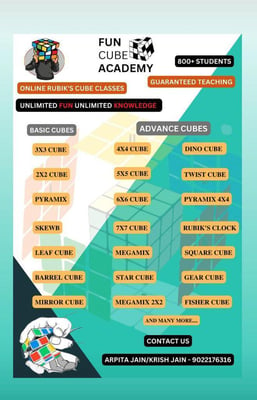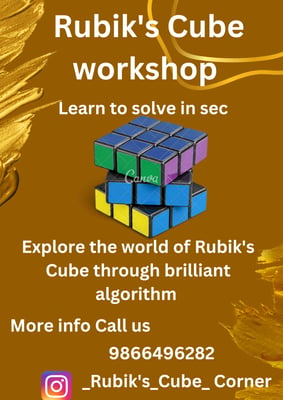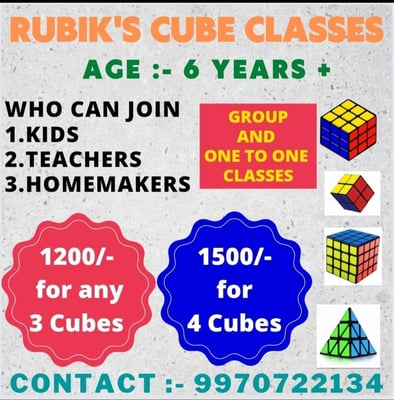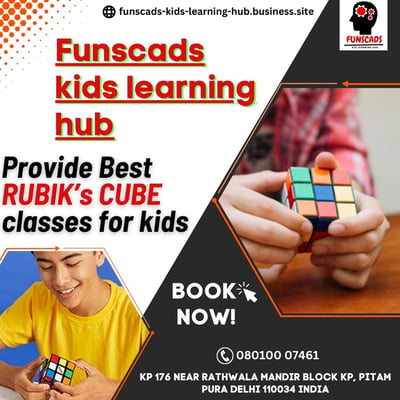Rubiks Cube classes for Kids - 17 options found
Rubik's Cube classes for children aged 2 to 15 offer numerou... Rubik's Cube classes for children aged 2 to 15 offer numerous benefits, including cognitive development, fine motor skills, patience, creativity, and socialization. Through structured instruction and practice, children develop problem-solving skills, spatial reasoning, and algorithmic thinking while enhancing hand-eye coordination and concentration. Participation in Rubik's Cube activities fosters resilience, teamwork, and a sense of community within the Rubik's Cube community. By engaging in the puzzle-solving process, children cultivate valuable skills and qualities that contribute to their personal growth and academic success, preparing them for future challenges and opportunities. Read more
amozish-summer camp
skillful minds-rubiks cube camp
funscads-rubiks cube classes
Advantages of Rubik's Cube Classes for Children Ages 2 to 15
Introduction
Rubik's Cube classes offer children aged 2 to 15 an opportunity to develop problem-solving skills, spatial reasoning, patience, and perseverance through solving the iconic Rubik's Cube puzzle. These classes provide numerous benefits, including cognitive development, enhanced fine motor skills, creativity, and personal growth. In this guide, we will explore the advantages of Rubik's Cube classes for children in this age range, along with addressing potential limitations and common questions.
Advantages
-
Cognitive Development:
- Problem-Solving Skills: Rubik's Cube classes foster problem-solving skills as children learn to manipulate the cube's colors to solve the puzzle. Solving the Rubik's Cube requires logical thinking, pattern recognition, and strategic planning.
- Spatial Reasoning: Manipulating the Rubik's Cube enhances spatial reasoning abilities as children visualize and rotate the cube's layers to align colors and patterns. Spatial reasoning is essential for understanding geometry and solving visual puzzles.
-
Fine Motor Skills:
- Hand-Eye Coordination: Solving the Rubik's Cube improves hand-eye coordination as children manipulate the cube's small, intricate components. Precise movements are required to turn the cube's layers accurately.
- Dexterity: Manipulating the Rubik's Cube requires fine motor skills and finger dexterity as children twist and turn the cube's sides to solve the puzzle. Fine motor skills are essential for tasks such as writing, drawing, and playing musical instruments.
-
Patience and Perseverance:
- Delayed Gratification: Solving the Rubik's Cube teaches children the value of patience and perseverance as they work through the puzzle's complexities. The process of solving the Rubik's Cube may require multiple attempts and experimentation before achieving success.
- Resilience: Facing challenges and setbacks in Rubik's Cube classes builds resilience as children learn to overcome frustration and persist in their efforts to solve the puzzle. Resilience is a valuable life skill that helps children navigate obstacles and achieve their goals.
-
Creativity and Innovation:
- Algorithmic Thinking: Rubik's Cube classes encourage algorithmic thinking as children develop step-by-step sequences to solve the puzzle efficiently. Creating and executing algorithms fosters creativity and innovation in problem-solving.
- Customization and Modification: Advanced Rubik's Cube enthusiasts may explore customizing and modifying their cubes with different stickers, colors, or mechanisms. This creative experimentation encourages innovation and personalization.
-
Cognitive Benefits:
- Memory Improvement: Solving the Rubik's Cube requires memorization of algorithms and sequences, enhancing memory retention and recall. Regular practice strengthens memory skills and cognitive flexibility.
- Concentration and Focus: Solving the Rubik's Cube requires sustained concentration and focus as children analyze patterns, execute algorithms, and track progress. Improved concentration transfers to other academic and extracurricular activities.
-
Socialization and Community:
- Shared Interest: Rubik's Cube classes provide a shared interest and common ground for children to connect with peers who share their enthusiasm for solving puzzles. Building friendships within the Rubik's Cube community fosters a sense of belonging and camaraderie.
- Competition and Collaboration: Participating in Rubik's Cube competitions or group-solving sessions allows children to experience friendly competition and collaborative problem-solving, developing teamwork and sportsmanship skills.
Limitations
-
Time Commitment:
- Practice Requirement: Achieving proficiency in solving the Rubik's Cube requires regular practice and dedication, which may compete with other academic or extracurricular commitments.
- Balance: Balancing time spent on Rubik's Cube practice with other activities is essential to avoid burnout or neglecting other responsibilities.
-
Access to Resources:
- Availability of Classes: Rubik's Cube classes may not be readily available in all areas, limiting access for children who are interested in learning or improving their skills.
- Cost: Participation in Rubik's Cube classes or competitions may involve costs for instruction, materials, or entry fees, which may be prohibitive for some families.
-
Competitive Pressure:
- Performance Expectations: In competitive environments, children may feel pressure to perform well and achieve fast solve times, which can lead to stress, anxiety, or feelings of inadequacy.
- Balancing Fun and Competition: Maintaining a balance between enjoying the puzzle-solving process and pursuing competitive goals is important for children's well-being and enjoyment of Rubik's Cube activities.
Common Questions
-
At What Age Should Children Start Rubik's Cube Classes?
- Children can start learning to solve the Rubik's Cube as early as preschool age, with simplified methods and instructions tailored to their developmental stage. Young children may enjoy the tactile sensation of turning the cube's sides and exploring color patterns.
-
How Can Parents Support Their Children's Interest in Rubik's Cube?
- Parents can support their children's interest in Rubik's Cube by providing access to instructional resources, practice cubes, and opportunities to participate in classes or competitions. Encouraging a growth mindset, celebrating progress, and providing positive reinforcement are also essential.
-
What Career Opportunities Are Available for Rubik's Cube Enthusiasts?
- While Rubik's Cube solving may not directly lead to specific career paths, proficiency in problem-solving, critical thinking, and spatial reasoning developed through Rubik's Cube activities are valuable skills applicable to various fields such as mathematics, engineering, computer science, and game design.
-
Is Solving the Rubik's Cube Only for Mathematically or Technically Inclined Children?
- No, solving the Rubik's Cube is a skill that can be learned and enjoyed by children with diverse interests and backgrounds. Rubik's Cube activities promote creativity, perseverance, and cognitive development, benefiting children of all aptitudes and abilities.
Conclusion
Rubik's Cube classes offer numerous advantages for children aged 2 to 15, including cognitive development, fine motor skills, patience, creativity, and socialization. While there may be limitations related to time commitment, access to resources, and competitive pressure, the benefits of Rubik's Cube education outweigh the drawbacks. By providing opportunities for children to learn and explore the Rubik's Cube puzzle in a supportive and engaging environment, educators, parents, and community leaders empower children to develop problem-solving skills, creativity, and resilience that will serve them well in academics, careers, and life.




